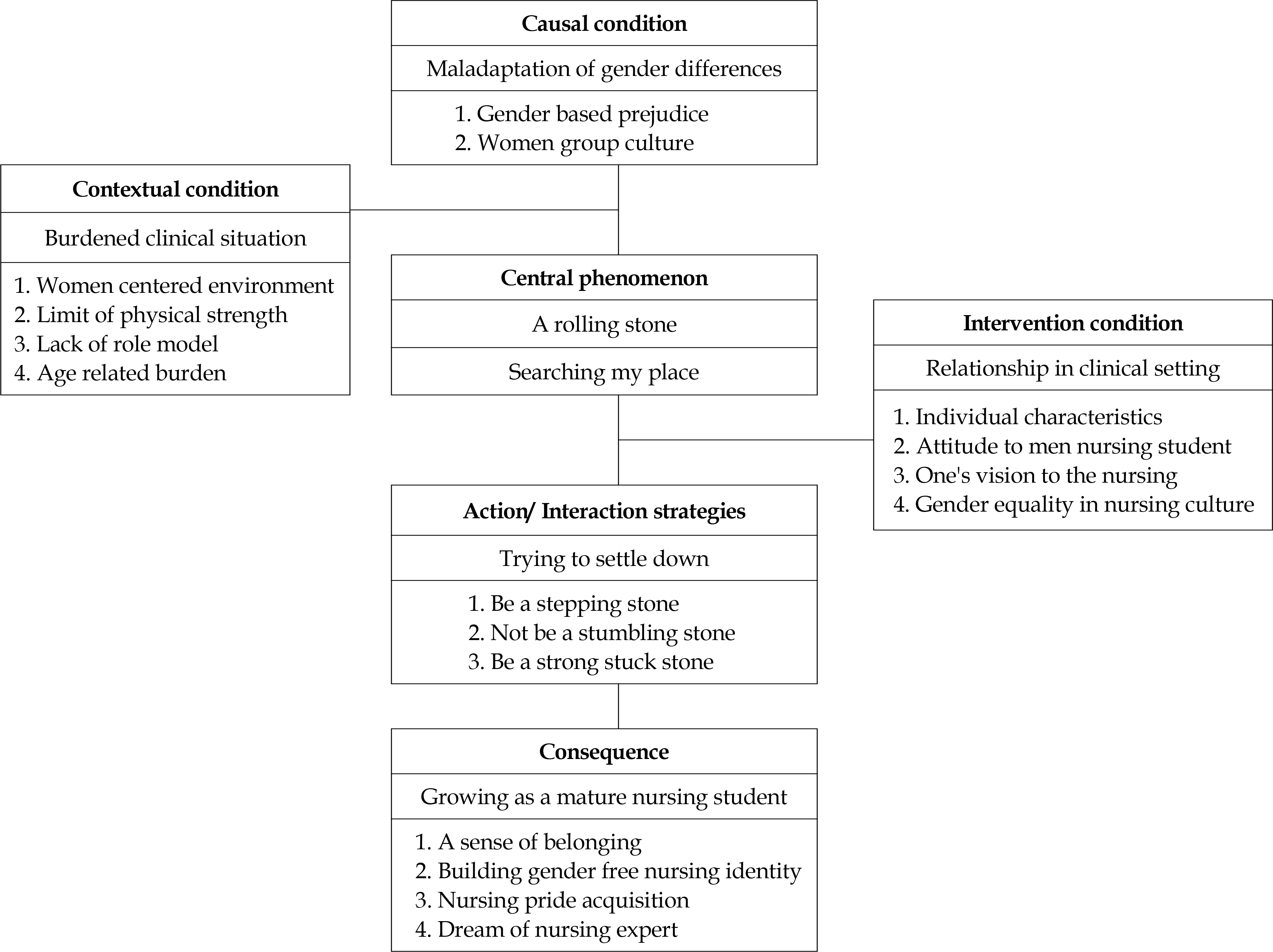Abstract
Purpose
The purpose of this study was to understand the stress coping experience of men nursing students in clinical practice.
Methods
In-depth interview were done using semi-structured questionnaire with 25 men nursing students taking clinical practice. Data were analyzed using grounded theory.
Results
Core category of coping experience of these nursing students was ‘a rolling stone’. Students’ coping strategies were ‘women centered environment’, ‘physical difficulty’, ‘lack of sufficient role models’, and ‘age related’. Helping components for their coping behaviors were ‘individual characteristics’, ‘attitude to men nursing student’, ‘one's vision of nursing’, and ‘gender equality in nursing culture’. The consequence of this phenomenon were ‘a sense of belonging’, ‘building gender free nursing identity’, ‘nursing pride acquisition’ and ‘dream of nursing expert’.
REFERENCES
1. Halstead JA, Rains JW, Boland DL, May FE. Reconceptuali-zing baccalaureate nursing education: outcomes and competencies for practice in the 21st century. Journal of Nursing Education. 1996; 35(9):413–416.

2. Meadus RJ, Twomey JC. Men student nurses: the nursing education experience. Nursing Forum. 2011; 46(4):269–279. https://doi.org/10.1111/j.1744-6198.2011.00239.x.

3. Son HM. Analysis of positioning in the nursing students' nar-rative of the experiences of clinical practice. The Journal of Korean Academic Society of Nursing Education. 2014; 20(1):129–137.

4. O'Lynn CH. Gender-based for male students in nursing education programs: prevalence and perceived importance. Journal of Nursing Education. 2004; 43(5):229–236.
5. Chung KS. Nurse national examination men passed 2,000 people. The Korean Nurses Association News [Internet]. 2017. February 16 [cited 2017 September 01]; Available from:. http://www.nursenews.co.kr/ebook_file/1911-1-1.pdf.
6. Kim JS, Sun JJ, Kim HS. Clinical practice experiences of nursing students. Journal of Qualitative Research. 2009; 10(1):63–76.
7. Evans J. Men nurses: a historical and feminist perspective. Journal of Advanced Nursing. 2004; 47(3):321–328. https://doi.org/10.1111/j.1365-2648.2004.03096.x.

8. Fooladi MM. Gender influence on nursing education and practice at Aga Khan university school of nursing in Karachi, Pakistan. Nurse Education in Practice. 2008; 8(4):231–238. https://doi.org/10.1016/j.nepr.2007.09.002.

9. Chan ZC, Lui CW, Cheung KL, Hung KK, Yu KH, Kei SH. Voices from a minority: experiences of Chinese male nursing students in clinical practice. American Journal of Men's Health. 2013; 7(4):295–305. https://doi.org/10.1177/1557988312473502.
10. Park C, Yuny S. Nursing students clinical experiences. Asia-Pacific Journal of Multimedia Services Convergent with Art, Humanities, and Sociology. 2017; 7(7):325–335. https://doi.org/10.14257/ajmahs.2017.07.19.

11. Chenitz WC, Swanson JM. From practice to grounded theory: qualitative research in nursing. Fist ed. Menlo Park, CA: Addison-Wesley;1986. p. 271.
12. Eswi A, El Sayed Y. The experience of Egyptian male student nurses during attending maternity nursing clinical course. Nurse Education in Practice. 2011; 11(2):93–98. https://doi.org/10.1016/j.nepr.2010.11.012.

13. Corbin J, Strauss A. Basics of qualitative research: techniques and procedures for developing grounded theory. 3rd ed.Newbury Park, CA: Sage Publications Inc.;2008. p. 456.
14. Mackintosh C. A historical study of men in nursing. Journal of Advanced Nursing. 1997; 26(2):232–236. https://doi.org/10.1046/j.1365-2648.1997.1997026232.x.

15. Lupton B. Maintaining masculinity: men who do ‘women's work’. British Journal of Management. 2000; 11(1):33–48. https://doi.org/10.1111/1467-8551.11.s1.4.

16. Popper-Giveon A, Keshet Y, Liberman I. Increasing gender and ethnic diversity in the health care workforce: the case of Arab male nurse in Israel. Nursing Outlook. 2015; 63(6):680–690. https://doi.org/10.1016/j.outlook.2015.08.001.
17. Choi SJ, Park KM. An initial clinical experience of male nursing students. Kemyung Society of Nursing Science. 2001; 5(1):129–139.
18. Streubert HJ. Male nursing students' perceptions of clinical experience. Nurse Educator. 1994; 19(5):29–32.

19. Sherwood S. Encyclopedia of trauma and traumatic stress disorders. Journal of Mental Health. 2010; 19(6):562. https://doi.org/10.3109/09638237.2010.520370.

20. Freudenberger HJ. The issues of staff burnout in therapeutic communities. Journal of Psychoactive Drugs. 1986; 18(3):247–251. https://doi.org/10.1080/02791072.1986.10472354.

21. Park HJ, Jang IS. Stress, depression, coping styles and satisfaction of clinical practice in nursing students. The Journal of Korean Academic Society of Nursing Education. 2010; 16(1):14–23.

22. Lazarus RS, Folkman S. Stress, appraisal, and coping. First ed. New York, NY: Springer Publishing Company;1984. p. 456.
23. Lo R. A longitudinal study of perceived level of stress, coping and self-esteem of undergraduate nursing students: an Australian case study. Journal of Advanced Nursing. 2002; 39(2):119–126.

24. Lee CS, Kim YJ. Moderated effects of coping strategies of stress: based on gender differences of university students. Studies on Korea Youth. 2004; 15(2):183–213.
Table 1.
Concepts, Subcategories, Categories, and Composition of Paradigm Related to Coping Experience in Clinical Practice of Men Nursing Students




 PDF
PDF ePub
ePub Citation
Citation Print
Print



 XML Download
XML Download